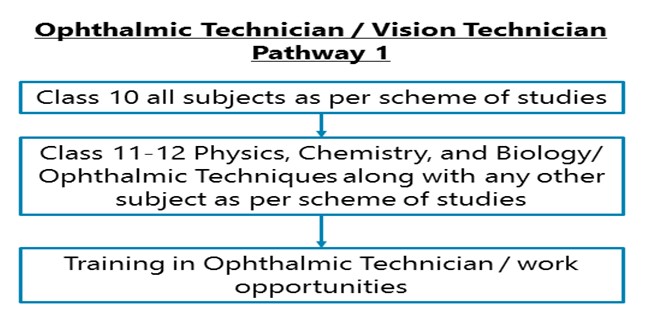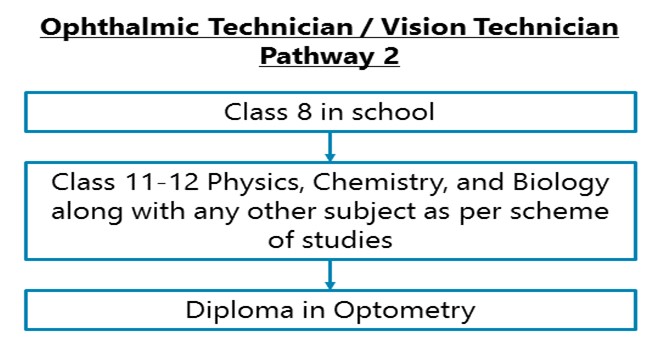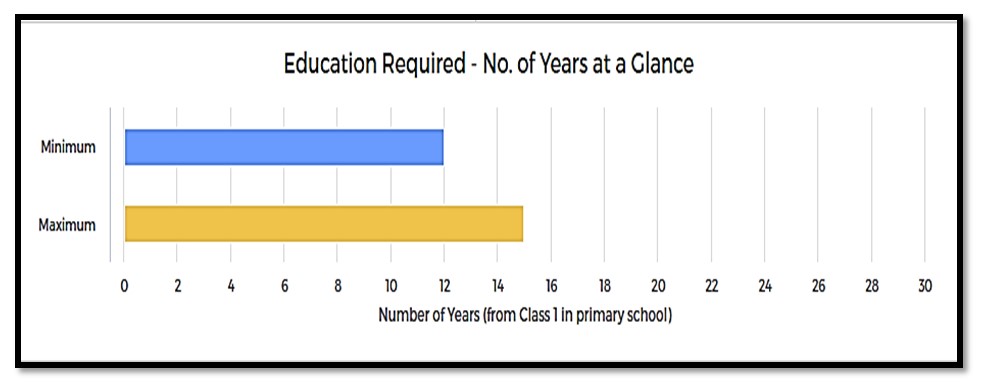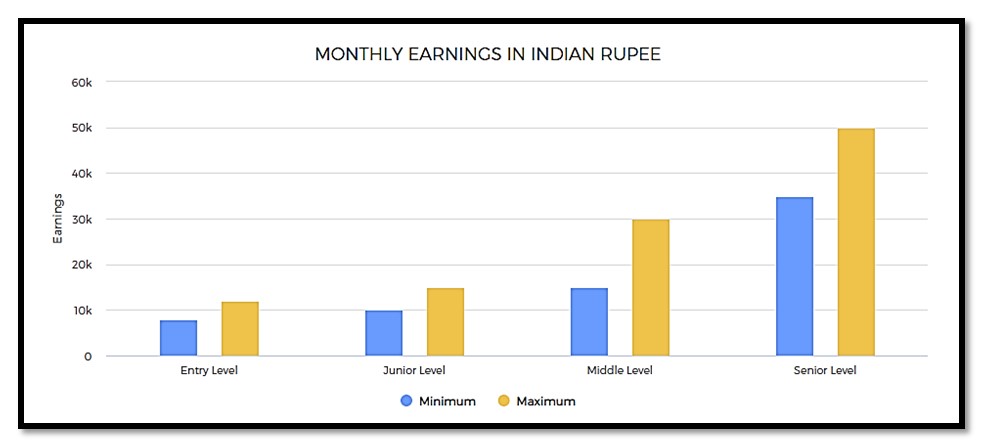Ophthalmic Technician
Entry Level Qualification
12
Career Fields
Allied & Para Medical Science
For Specially Abled




About Career
1. Ophthalmic Technicians (also referred to as Vision Technicians) assist Ophthalmologists and optometrists in delivering eye care services which include diagnosis, treatment, and prevention of eye diseases, disorders, and injuries. As an Ophthalmic Technician, you may operate and maintain various medical instruments and devices used in the diagnosis and treatment of eye diseases and disorders. You will help the Ophthalmologist by taking a medical history of the patients, making the patients understand various diagnostic and treatment procedures, and preparing them for various eye examination procedures.
2. Ophthalmic Technicians may perform eye examinations or diagnostic tests and explain the results to patients. They explain the use of medication and other processes for eye care to patients. You will often assist Ophthalmologists in delivering vision therapies and eye exercises for the management and cure of eye diseases and disorders.
3. As an Ophthalmic Technician, you may help Optometrists and Ophthalmologists with vision measurement, helping patients with the necessary understanding of how to use eyeglasses and contact lenses. You may work with Opticians to help people choose the right glasses and lenses. You will ensure that the eyeglasses and lenses are as per the prescriptions of the Optometrists. You may help in making and repairing eyeglasses. You will help customers select the right frames for glasses.
Key roles and responsibilities
1. Taking a medical history of patients.
2. Instructing and educating patients about eye care, glasses, and lenses.
3. Helping in the delivery of vision therapy and eye exercises.
4. Carrying out eye examinations and diagnostic tests under the guidance of an Optometrist or Ophthalmologist.
5. Management of patients at an eye clinic or hospital - coordinating for appointment scheduling, maintaining patient records, etc.
6. Operating, cleaning, and maintaining various medical equipment and devices used in eye care.
7. You may assist Ophthalmologists in carrying out eye surgeries.
PARTICULARS | DESCRIPTION |
Name | Ophthalmic Technician |
Purpose | Management of Patients |
Career Field | Allied & Para Medical Science |
Required Entrance Exam | CUET UG, AIIMS BSC |
Average Salary | 100000 - 150000 Rs. Per Year |
Companies For You | Eye clinics, Specialty Eye Hospitals, Optician Stores & Many More |
Who is Eligible | Class 12th Pass |
Career Entry Pathway
Class 10 all subjects as per the scheme of studies – Class 11-12 Physics, Chemistry, and Biology/ Ophthalmic Techniques along with any other subject as per the scheme of studies - Training in Ophthalmic Technician/work opportunities.

Finish Class 12 as above. If you are from the vocational stream you can directly get a job or you can do a training program in Ophthalmic Technician/Ophthalmic Assistant which is equivalent to NSQF Level 3 requirements.

Finish Class 12 as above. Then you can do a Diploma in Optometry course which is of 2 duration.
Required Qualification & Competencies
To become an Ophthalmic Technician, you can obtain a Diploma in Optometry / Ophthalmic Technology or a Diploma/Certificate in Ophthalmic Assistant.
MINIMUM EDUCATION REQUIRED | MAXIMUM EDUCATION REQUIRED |
Post-Secondary Certificate / Diploma Programs for which the minimum eligibility is a pass in class X. | Under Secondary Certificate Programs for which the minimum eligibility is a pass in any class below class X. |

Competencies Required
Interest
1. Realistic: You should have an interest in Realistic Occupations. Realistic occupations involve more practical and hands-on activities than paperwork or office work. Realistic occupations often involve physical activities for getting things done using various tools and equipment.
2. Conventional: You should have interests in Conventional Occupations. Conventional occupations involve repetitive and routine tasks as well as fixed processes or procedures for getting things done. These occupations involve working more with data, systems, and procedures and less with ideas or creativity.
3. Social: You should have an interest in Social Occupations. Social occupations involve helping or assisting others; these involve working with and communicating with people to provide various services; these may involve educating and advising others.
Knowledge
1. Healthcare Services: Knowledge of different fields that are related to offering various types of healthcare services to people; assisting physicians and surgeons to carry out diagnosis, treatment, and prevention of human diseases, ailments, and disorders. This includes knowledge of different practices apart from medicine which are used to treat and prevent human diseases or to provide holistic healthcare and wellness. This also includes knowledge about drugs and medicines.
2. Personal Care Service: Knowledge of how to provide various assistance and services to others. This includes looking after the needs of individuals, understanding what they need, and providing all assistance at home or elsewhere.
Skills
1. Active Listening: Giving full attention to what other people are saying, understanding the points being made by others, asking questions, etc.
2. Critical Thinking: Skills in analysis of complex situations, using of logic and reasoning to understand the situations and take appropriate actions or make interpretations and inferences.
3. Judgment and Decision Making: Skills in considering the pros and cons of various decision alternatives; considering costs and benefits; and making appropriate and suitable decisions.
4. Problem Solving: Skills in analysis and understanding of problems, evaluating various options to solve the problems, and using the best option to solve the problems.
5. Technical: Skills in using various technologies and technical methods including cardiovascular knowledge and use of medical technologies, performing diagnostic procedures, etc.
Abilities
1. Deductive Reasoning: The ability to apply general rules and common logic to specific problems to produce answers that are logical and make sense. For example, understanding the reasons behind an event or a situation using general rules and common logic
2. Inductive Reasoning: The ability to combine pieces of information from various sources, concepts, and theories to form general rules or conclusions. For example, analyzing various events or situations to come out with a set of rules or conclusions
3. Inter-Personal: The ability to build and maintain good relationships with others at workplaces and elsewhere.
4. Problem Sensitivity: The ability to tell when something is wrong or is likely to go wrong. It does not involve solving the problem, only recognizing there is a problem.
Personality
1. You are always or mostly organized in your day-to-day life and activities.
2. You remain calm in emergencies and work well under pressure
3. You always feel secure in your surroundings and most situations.
4. You are a soft-hearted person sometimes.
5. You trust others sometimes but not always.
6. You act independently sometimes but do not do so at some other times.
7. You are always practical in most situations.
Career - Job Opportunities & Profiles
You will get work opportunities as an Ophthalmic Assistant or as an Optometrist Assistant at:
1. Eye clinics
2. Specialty eye hospitals
3. Hospitals (In the Ophthalmology departments)
4. Optician Stores
Career Growth
There is no noteworthy progress in your career as an Ophthalmic Technician except that your earning will increase over time. However, you may obtain higher qualifications for better progress in your career.
Salary Offered
As an Ophthalmic Technician, you will earn about Rs. 8,000-12,000 at the beginning of your career. With experience, your earnings will increase. Technicians with 8-10 years of experience may earn about Rs. 15,000-30,000 a month and those with 15-20 years of experience may earn about Rs. 35,000-50,000 or even more a month.

Monthly Earnings In Indian Rupee
Entry Level | Junior Level | Mid-Level | Senior Level | ||||
Min Earning | Max Earning | Min Earning | Max Earning | Min Earning | Max Earning | Min Earning | Max Earning |
8000 | 12000 | 10000 | 15000 | 15000 | 30000 | 35000 | 50000 |
1. Entry level: 0 - 2 years of work experience
2. Junior Level: From 1 to 12 years of work experience
3. Mid-Level: From 5 to 20+ years of work experience
4. Senior Level: From 10 to 25+ years of work experience (there could be exceptions in some high-end technical, financial, engineering, creative, management, sports, and other careers; also shortly, people will reach these levels much faster in many careers and some careers, these levels will have no meaning as those careers will be completely tech skill driven such as even now, there is almost no level in a Cyber Security Expert’s job)
Work Activities
1. Assisting and caring for people: Assisting people in availing of services; taking care of people in different situations; offering help and services to others.
2. Communicating with co-workers and others: Communicating with people in writing, verbally or otherwise inside your workplace and various other people who have professional relationships with your place of work including vendors, government officials, etc., or with people at large.
3. Decision-making and problem-solving: Analysis of data and information; evaluation of alternative decisions and results of decisions; taking the right decisions and solving problems.
4. Getting Information and learning: Observing, hearing, reading, using computers, or otherwise obtaining information and learning from it.
5. Identifying objects, actions, and events: Identifying various characteristics of objects; observing and understanding actions and events; understanding changes in actions and events.
6. Inspecting situations, events, and people: Inspecting situations, events, and people to understand the reasons and causes for the situation or events to happen; inspecting people to understand reasons behind their behavior and actions.
7. Updating and using relevant knowledge: Keeping updated with the latest knowledge relevant to your fields of work and using the relevant knowledge in getting things done.
8. Working directly with people: Working directly with people to offer them products and services, providing assistance, etc.
Future Prospects
The healthcare industry is expected to grow by 22-25 percent. This indicates bright prospects for those aspiring for a job in this industry. The country’s expenditure on medical infrastructure and equipment is also rapidly increasing, this is creating a lot of awareness among people.

Future Prospects At A Glance
Current (0-1 year) | Long Term (2-5 years) | Very Long Term (6-10 years) |
High Growth | High Growth | High Growth |


